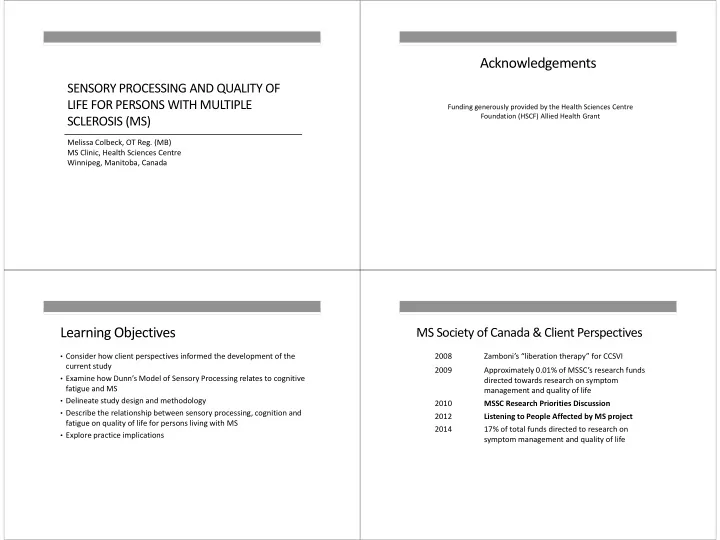

Acknowledgements SENSORY PROCESSING AND QUALITY OF LIFE FOR PERSONS WITH MULTIPLE Funding generously provided by the Health Sciences Centre Foundation (HSCF) Allied Health Grant SCLEROSIS (MS) Melissa Colbeck, OT Reg. (MB) MS Clinic, Health Sciences Centre Winnipeg, Manitoba, Canada Learning Objectives MS Society of Canada & Client Perspectives • Consider how client perspectives informed the development of the 2008 Zamboni’s “liberation therapy” for CCSVI current study 2009 Approximately 0.01% of MSSC’s research funds • Examine how Dunn’s Model of Sensory Processing relates to cognitive directed towards research on symptom fatigue and MS management and quality of life • Delineate study design and methodology 2010 MSSC Research Priorities Discussion • Describe the relationship between sensory processing, cognition and 2012 Listening to People Affected by MS project fatigue on quality of life for persons living with MS 2014 17% of total funds directed to research on • Explore practice implications symptom management and quality of life
Sensory Processing & Quality of Life Literature Review Common Common presentation presentation Thalamus as the relay Thalamus as the relay Thalamic atrophy in Thalamic atrophy in between sensory, between sensory, station for sensory station for sensory MS and related MS and related cognitive and fatigue cognitive and fatigue processing processing diagnoses diagnoses issues issues Potential genetic and Potential genetic and Is it viable to use sensory Is it viable to use sensory environmental environmental processing theory to processing theory to factors impact both factors impact both improve quality of life for improve quality of life for MS and SP MS and SP persons living with MS? persons living with MS? “ Sensory Overload ” by Gretchen Leary Hypotheses Objective There is a significant inverse relationship between atypical To describe how sensory Sensory Sensory sensory processing preferences and quality of life: processing preferences, Processing Processing cognition and fatigue relate to Higher scores in low registration and sensory Cognition Cognition 1. variances in quality of life sensitivity are related to a lower HRQoL score. 2. Higher scores in low registration and sensory Fatigue Fatigue sensitivity are related to high levels of cognitive fatigue. Quality of Life
Methods Data Collection • Approved by the HREB at the University of Manitoba and the • Demographics (age, sex, and diagnosis from the EMR) Health Sciences Centre Impact Committee • Adolescent/Adult Sensory Profile (AASP) • Potential participants were screened through the MS Database • Modified Fatigue Impact Scale (MFIS) and Registry • Montreal Cognitive Assessment (MoCA) • Cross ‐ sectional study design to collect data from adults living with • RAND ‐ 36 MS who have been recently referred to occupational therapy for cognitive and/or fatigue assessment Results Results: Physical Fatigue & QoL Description of Sample Size Age Sex Clinical MoCA MFIS AASP HRQoL (Range, Mean) course (Mean, SD) (Mean, SD) Cognitive “More than most people” N=30 20 ‐ 66, 48 22 female 18 24 > cut ‐ off subscale 21.7, in low registration Physical 8.0 (40.2, 7.8) 8 male RRMS 6 < cut ‐ off Fatigue Physical “More than most people” 8 SPMS subscale 28.2, in sensory sensitivity 7.9 (42.5, 8.4) 3 PPMS Moderate negative correlation between MFIS physical fatigue 1 subscale and RAND ‐ 36 Physical Functioning ( ‐ .44, p=.02) and Energy/Fatigue ( ‐ .47, p=.009) PRMS
Results: Cognitive Fatigue & QoL Results: Sensory Processing Higher HRQoL “More Than “More Than threshold for Most People” in registration Most People” Sensory in Low means when it Sensitivity Cognitive Registration does register, it (AASP) is already too Fatigue (AASP) much Moderate negative correlation between MFIS cognitive fatigue and Sample significant for “More than most people” mean scores in low RAND ‐ 36 Role Limitations Emotional ( ‐ .49, p=.0075), Emotional registration (40) and sensory sensitivity (43) per the AASP Wellbeing ( ‐ .47, p=.009), Social Functioning ( ‐ .47, p=.009) and General Health ( ‐ .55, p=.0015) Results: Sensory Processing & QoL Results: Sensory Processing & Cognitive Fatigue Low Registration correlates with Sensory Seeking correlates with decreased social functioning Low Registration correlates with Sensory Seeking DOES NOT higher levels of emotional and emotional wellbeing, as increased cognitive fatigue correlate with cognitive fatigue wellbeing well as increased role limitations Sensation Avoiding correlates Sensory Sensitivity correlates with decreased social with decreased emotional functioning, emotional Sensory Sensitivity correlates Sensation Avoiding correlates wellbeing, general health, as wellbeing, and general health, with increased cognitive fatigue with increased cognitive fatigue well as increased role limitations as well as increased role limitations
Conclusions Practice Implications • Quality of life is impacted by sensory processing preferences and • Finding consistent with literature documenting distinct patterns of fatigue sensory processing across disabilities and diagnosis • Sensory processing preferences are related to cognitive fatigue, and • Intervention may be focused on education, self regulation, presentation of cognitive or fatigue impairments needs to be modulation, shaping the environment, and communication considered alongside sensory processing • Knowledge is power. Power impacts choice. Choice improves quality of life. Practice Implications Limitations • Sensory processing preferences are assumed to be stable across the lifespan, but has not been established via a longitudinal study “Central to sensory integration and processing disorders is a disruption of the ability to engage and participate • No gold standard for measuring fatigue, cognitive fatigue and in everyday occupations, and addressing this issue “fatigability” over time is the core of occupational therapy.” • Study did not address depression and anxiety, which are linked to (Lane & Lynn, 2011) sensory processing and highly prevalent in MS
Future Directions Questions? • Development and piloting of an intervention program based on sensory processing patterns and preferences for people living with MS Melissa Colbeck OT Reg. (MB) • Explore the role of sensory processing related to “fatigability” MS Clinic Occupational Therapy and cognitive fatigue Health Sciences Centre RR180-820 Sherbrook St. Winnipeg, Manitoba, Canada R3A1R9 mcolbeck@hsc.mb.ca Phone: (204) 787-4536 Fax: (204) 787-1101
Recommend
More recommend